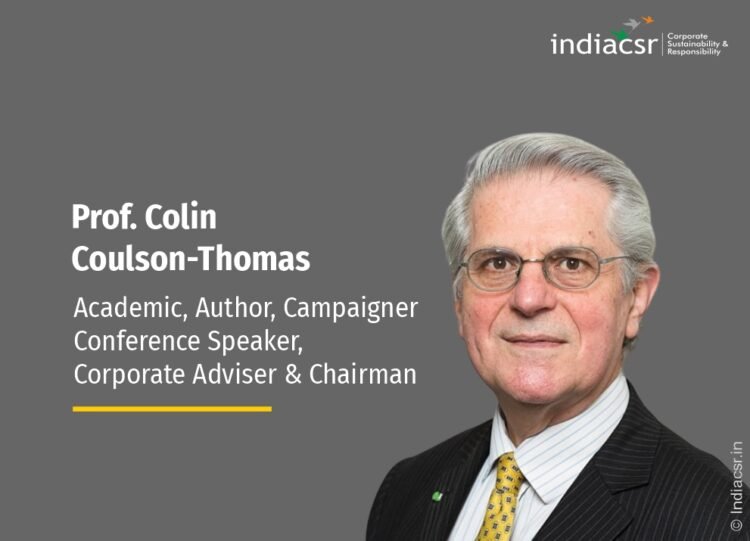By Prof Colin Coulson-Thomas
A VUCA world is said to be characterised by volatility, uncertainty, complexity and ambiguity. If we live in a VUCA world, it is one that we have collectively created. There is growing consensus, clarity and certainty regarding the environmental consequences of human activity. The negative impacts are unambiguous. The evidence is explicit and all around us.
Unsustainable growth, development, lifestyles and business activities are damaging the environment, reducing biodiversity, depleting natural capital and contributing to global warming and climate change. Boards need to urgently identify, recognise, assess and address the negative externalities of corporate activities and operations.
Responsible boards avoid proposals that are unsustainable or would consume natural resources likely to be required by future generations to cope with the higher adaptation costs, losses and damages they are likely to face from climate change. Developments that might trigger tipping points and result in escalating and unstoppable harm should be avoided.
Boards should pay particular attention to activities within their supply and value chains. For many companies, this may be where the bulk of negative externalities might arise. Boards should also commission financial reports and accounts, and request investment proposals, that take the negative impacts of corporate activities and operations into account.
An increasingly wide range of people, organisations and communities around the world are being impacted by multiple existential threats. They have a common interest in the development and adoption of affordable, sustainable and more inclusive solutions to shared challenges and unlocking and benefitting from related opportunities.
Boards should be open to cooperation and collaboration with likeminded, complementary and compatible interests. They should identify and pursue shared goals, whether these involve mitigation and adaptation measures, or travelling together on transition and transformation journeys to more inclusive and sustainable business, operating and organisational models.
Stakeholders increasingly voice ESG concerns, embrace ESG considerations and are influenced by ESG criteria. ESG credentials can attract talent and encourage longer-term investment and stakeholder support. All items on the boardroom and investment agenda and all corporate and investor activities and their impacts should be viewed through an ESG lens.
Board and investment stewardship and oversight should be responsible and reflect ESG considerations and policy. ESG criteria should apply to all corporate and investment proposals. They should underpin corporate and investment purpose, vision, values, goals and objectives, and the strategies, policies and behaviours to achieve them.
Boards, investors and other interested parties should be aware of the consequences of corporate activities, alert to developments in the business environment affecting them, and sensitive to changing stakeholder views about them. Directors should proactively take steps to ensure corporate activities have more beneficial and less damaging impacts.
Closer engagement with stakeholders may enable opportunities to be identified for less environmentally detrimental and resource intensive ways of delivering value. Greater awareness of their ESG concerns and changing aspirations and priorities might inspire the creation of healthier and more inclusive, sustainable and fulfilling lifestyle options.
As well as focusing on the reduction of harmful activities and ending unsustainable operations, boards and investors should proactively seek positive opportunities and collective initiatives to create, enable and support operations, activities and ways of working and learning and urban and rural living that are desirable as well as sustainable.
While pursuing ambitious environmental and social goals and objectives, boards should be open, receptive and flexible in relation to new opportunities, emerging possibilities and changing stakeholder aspirations, concerns and priorities. They should inspire, enable and support responsible innovation, enterprise and entrepreneurship.
Boards, investors and other stakeholders should work together to ensure their purposes and priorities, their roles and reporting, and regulatory and governance frameworks, encourage and support transition to a more responsible and inclusive form of stakeholder and collaborative capitalism.
Creating more responsible, inclusive and sustainable corporate futures and lifestyles may require significant, if not radical, changes of priorities. It might also need a switch of focus from current activities to outcomes that concerned stakeholders increasingly require and seek.
ESG strategies are about opportunity and responsible innovation, enterprise and capitalism. Boards should encourage the offering of new options and choices for stakeholders and wider communities to live and operate more sustainably and in harmony with the natural world.
(The article is based on Prof Colin Coulson-Thomas talk delivered at IOD (India) Directors’ Dialogue on 23rd February 2022)
About the Author
Prof Colin Coulson-Thomas holds a portfolio of leadership roles and is IOD India’s Director-General, UK and Europe and President of the Institute of Management Services. He has advised directors and boards in over 40 countries.
(India CSR)







